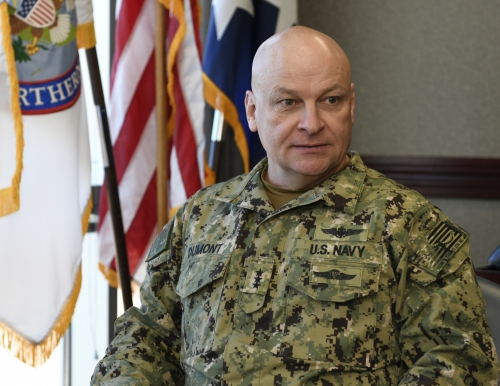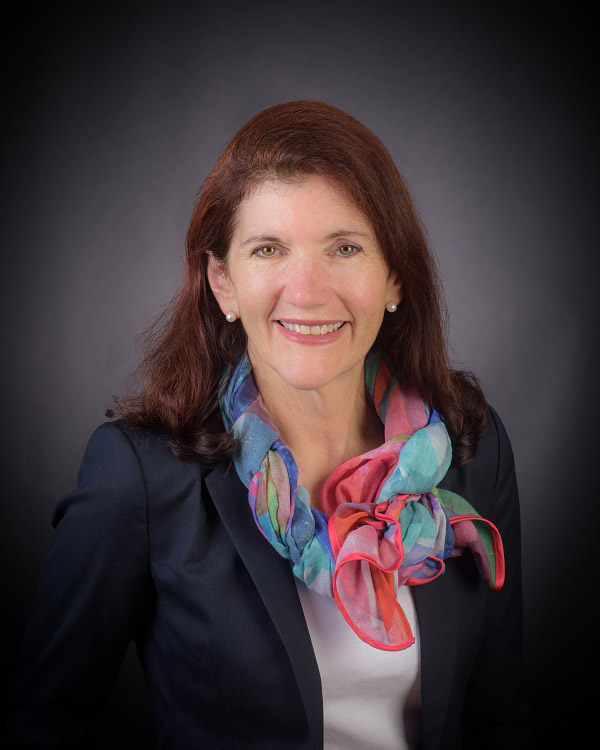When Michael Dumont entered the University of Southern Maine as a criminology major, he was going to be a police officer.

The second of eight kids from Brunswick, Maine, he worked a bit after high school. He spent a year in a technical school, and was filling part-time shifts as a local cop when he enrolled at USM.
The university made him think bigger.
“USM exposed me to what was going on locally, nationally and internationally,” Dumont said. “I think that’s what piqued my interest for what was possible for me.”
Today, Dumont is one of the highest ranking officers in the U.S. Navy — a vice admiral — and he’s not alone among USM alumni. Dumont says the school is linked to “an unheard of” number of top admirals and generals who graduated in the 70s, 80s and 90s.
“When I look back at my time at USM, I had really wonderful professors who were invested in their students,” he said. “There was a theme of public service or giving back.”
The alumni include now-retired Vice Admiral John Currier ‘76, who became the vice commandant of the U.S. Coast Guard. Rear Adm. (Upper Half) William Leigher ‘80 worked for the chief of Naval Operations as the director of Warfare Integration for Information Dominance.
Lt. Gen. Dorothy Hogg, who graduated one year after Leigher, currently serves as the Surgeon General of the U.S. Air Force. Rear Adm. Margaret Deluca “Peg” Klein ‘99 served as senior advisor to the Secretary of Defense for military professionalism before retiring in early 2017. She now serves as the dean of the College of Leadership and Ethics at the U.S. Naval War College.
And Dumont is protecting North America.
After a long career — often taking him into White House briefings — he is serving as the deputy commander of the U.S. Northern Command. He is stationed in Peterson Air Force Base in Colorado.
“I help the commander oversee US Northern Command, which is the geographic combatant command responsible for the defense of the United States,” Dumont said in recent phone interview.
Even in that role, he still uses lessons he learned as a student at USM.
“What I practiced there on building relationships and understanding all sides of an argument resonated with me throughout my career and it stays with me today,” he said.

Klein, who graduated 15 years after Dumont, learned similar lessons. They became even more important when she was promoted to admiral, often referred to as “flag rank.”
“When I made flag, the ability to hold different perspectives in balance was really important,” she said. “I don’t know whether USM intentionally taught me that, or whether it was something they did because it was a really diverse place in terms of money, aspirations and background.”
Unlike Dumont, she entered USM as an Annapolis graduate, a Naval officer and the wife of a Naval officer. Having also grown up in a military family, she’d been insulated from civilian life. At USM she enrolled in the Master’s in Education program and was immediately struck by the variety of students from many backgrounds.
“The Navy kept us fairly insular,” she said. “They kept us busy and they kept us on the move. So, you don’t have time to blend in with the community.”
After the rigors of the Naval Academy, she loved attending USM’s night classes and getting to know the other students.
“I got to know my classmates really well,” she said. She loved writing, particularly the process of crafting her thesis. In a way, it helped her learn what she thought and why.
“I understood that my military perspective wasn’t the only one in the world,” she said.
After she graduated, Klein went on to increasingly prestigious jobs. In 2011, she commanded an American military force of five ships, 30 aircraft, and over 3,300 sailors and Marines in combat operations in the Mediterranean Sea.
Dumont began his military career while at USM.
A friend encouraged him to join the Army ROTC program as a sophomore. He earned his commission after graduation.
The Army taught Dumont to fly helicopters, and he served in active duty for five years. When he left the Army, he enrolled at Suffolk University Law School in Boston and joined the Naval Reserve to help pay his way.
In civilian life, Dumont became a state prosecutor. He would go on to serve as a federal prosecutor in the Criminal Division of the U.S. Department of Justice before joining the Department of Defense. His Pentagon jobs included Deputy Assistant Secretary of Defense for Afghanistan, Pakistan & Central Asia and Principal Deputy Assistant Secretary of Defense for Special Operations.
The work made him a regular in the White House under several presidents. It’s work he continued on active duty in the Navy.
“It’s a front row seat to policy making in some really, really sensitive decisions about ‘How long are we staying in Afghanistan?’ and ‘Are we going to send troops to Syria?’ It’s these types of things,” Dumont said.
“You have to have done your homework. You have to be confident in your position, and you have to be prepared to take a position on behalf of your organization,” he said. “It takes a lot of preparation and self study.
“It’s talking truth to power, up close and personal, face to face,” Dumont said.
He began learning those skills at USM.
“It’s a university that taught us exceptional critical thinking skills and a sense of public service,” he said. “I know USM stretched my critical thinking skills.”
Perhaps that’s why so many USM alumni have reached such high rank, he said.
“It’s really surprising when I talk to other people who didn’t come out of the military academies or from The Citadel (The military college of South Carolina) or Norwich (University),” he said. “For all of us to come out of USM, it’s amazing.”

